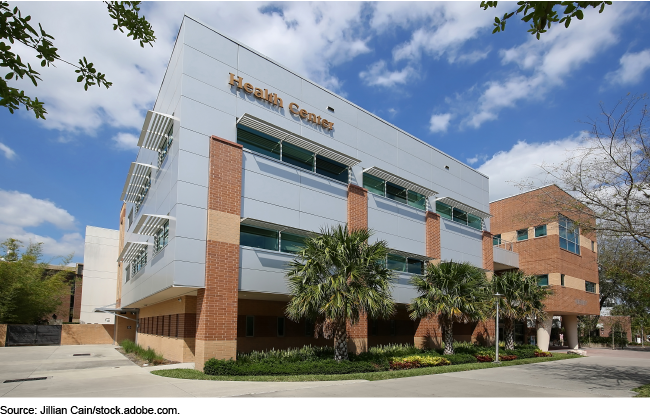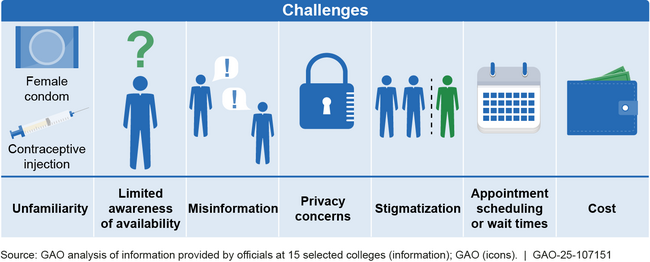Higher Education: College Student Access to Sexual and Reproductive Health Care
Fast Facts
Colleges provide many health services to students on campuses—including sexual and reproductive health care.
College officials we interviewed said students face challenges accessing this care, such as misinformation, being unaware of services available on campus, and privacy concerns. For example, officials at most colleges we interviewed said that students were concerned that their use of sexual health services might be disclosed to their parents.
Some colleges have started taking steps to address these challenges, like holding panel events where students can anonymously submit questions about reproductive health care and get expert answers.

Highlights
What GAO Found
Most of the 15 selected colleges GAO interviewed offered a variety of on-campus sexual and reproductive health care for students through their student health center. For example, officials at all of the colleges said they offered menstrual products and pregnancy tests, and 12 of the 15 colleges offered sexually transmitted infection (STI) tests. Among contraceptives, college officials said male condoms and oral contraceptives were most commonly available (at 12 of the 15 colleges), while contraceptive implants and intrauterine devices were less commonly available. Medication abortion was available at one college and procedural abortion was not available at any, according to college officials. Various factors affected sexual and reproductive health care offered on campus, including costs, colleges' interpretation of state laws, political sensitivities, and religious affiliation, according to college officials.
Officials at the selected colleges said students faced challenges seeking sexual and reproductive health care on campus, including unfamiliarity with sexual and reproductive health care, privacy concerns, and cost, among others (see figure). The selected colleges took various actions to address challenges, such as
- holding on-campus educational events;
- using health educators to share information; and
- implementing measures to enhance privacy at their student health center.
Challenges to Students Seeking Sexual and Reproductive Health Care Cited Among 15 Selected Colleges

Officials at 14 selected colleges said they did not offer any abortion services before or after the start of the 2021-2022 academic year—the year prior to the U.S. Supreme Court decision in Dobbs v. Jackson Women's Health Organization —and officials at one said they began offering medication abortion in February 2021 due to state law. Officials at one college said they discontinued offering off-campus referrals for abortion services due to their state's political environment. In addition, officials at six colleges said some students asked more questions or otherwise expressed more uncertainty about their ability to access abortion services after the start of the 2021-2022 academic year. Officials at most colleges said availability and demand increased for other on-campus sexual and reproductive health care, such as pregnancy testing and contraception.
Why GAO Did This Study
About 19 million students were enrolled in nearly 3,900 degree-granting colleges across the U.S. during the fall 2022 semester. Many colleges have student health centers that provide health care to the students on their campuses. Among other things, student health centers may offer sexual and reproductive health care, which includes things such as STI testing and prevention; contraception; emergency contraception; pregnancy testing; abortion; and menstrual products. In June 2022, the U.S. Supreme Court concluded in Dobbs v. Jackson Women's Health Organization that the U.S. Constitution does not confer the right to abortion.
GAO was asked to review college students' access to sexual and reproductive health care. This report describes: (1) the availability of on-campus sexual and reproductive health care at selected colleges; (2) challenges students faced in seeking sexual and reproductive health care at selected colleges and efforts those colleges took to address them; and (3) how the availability of sexual and reproductive health care at selected colleges changed since the start of the 2021-2022 academic year.
GAO interviewed officials from a nongeneralizable sample of 15 colleges, selected on the basis of program length, location, religious affiliation, size, and other factors. GAO also interviewed three professional organizations and four colleges' health educators. GAO also analyzed data from the American College Health Association's Sexual Health Services Survey for calendar year 2022, the most recent available.
For more information, contact John E. Dicken at (202) 512-7114 or dickenj@gao.gov, or Melissa Emrey-Arras at (202) 512-7215 or emreyarrasm@gao.gov.
